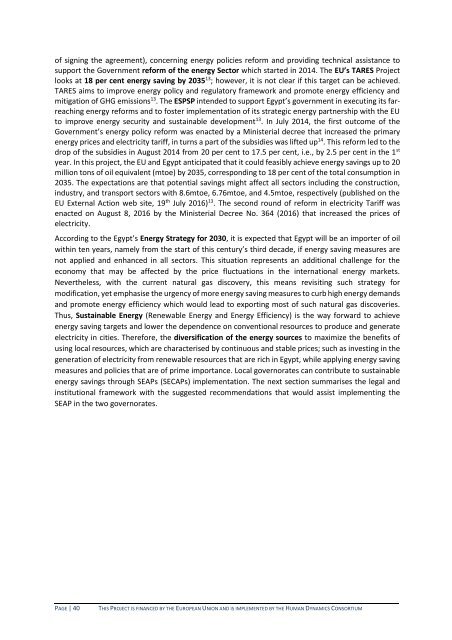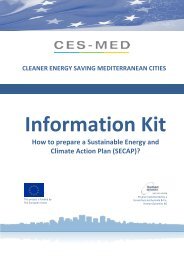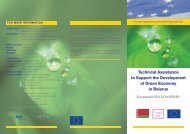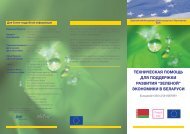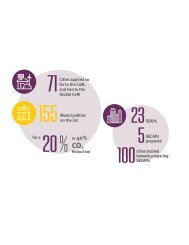180917_CES-MED_National_Report_Egypt_FINAL2rev
You also want an ePaper? Increase the reach of your titles
YUMPU automatically turns print PDFs into web optimized ePapers that Google loves.
of signing the agreement), concerning energy policies reform and providing technical assistance to<br />
support the Government reform of the energy Sector which started in 2014. The EU’s TARES Project<br />
looks at 18 per cent energy saving by 2035 13 ; however, it is not clear if this target can be achieved.<br />
TARES aims to improve energy policy and regulatory framework and promote energy efficiency and<br />
mitigation of GHG emissions 13 . The ESPSP intended to support <strong>Egypt</strong>’s government in executing its farreaching<br />
energy reforms and to foster implementation of its strategic energy partnership with the EU<br />
to improve energy security and sustainable development 13 . In July 2014, the first outcome of the<br />
Government’s energy policy reform was enacted by a Ministerial decree that increased the primary<br />
energy prices and electricity tariff, in turns a part of the subsidies was lifted up 14 . This reform led to the<br />
drop of the subsidies in August 2014 from 20 per cent to 17.5 per cent, i.e., by 2.5 per cent in the 1 st<br />
year. In this project, the EU and <strong>Egypt</strong> anticipated that it could feasibly achieve energy savings up to 20<br />
million tons of oil equivalent (mtoe) by 2035, corresponding to 18 per cent of the total consumption in<br />
2035. The expectations are that potential savings might affect all sectors including the construction,<br />
industry, and transport sectors with 8.6mtoe, 6.76mtoe, and 4.5mtoe, respectively (published on the<br />
EU External Action web site, 19 th July 2016) 13 . The second round of reform in electricity Tariff was<br />
enacted on August 8, 2016 by the Ministerial Decree No. 364 (2016) that increased the prices of<br />
electricity.<br />
According to the <strong>Egypt</strong>’s Energy Strategy for 2030, it is expected that <strong>Egypt</strong> will be an importer of oil<br />
within ten years, namely from the start of this century’s third decade, if energy saving measures are<br />
not applied and enhanced in all sectors. This situation represents an additional challenge for the<br />
economy that may be affected by the price fluctuations in the international energy markets.<br />
Nevertheless, with the current natural gas discovery, this means revisiting such strategy for<br />
modification, yet emphasise the urgency of more energy saving measures to curb high energy demands<br />
and promote energy efficiency which would lead to exporting most of such natural gas discoveries.<br />
Thus, Sustainable Energy (Renewable Energy and Energy Efficiency) is the way forward to achieve<br />
energy saving targets and lower the dependence on conventional resources to produce and generate<br />
electricity in cities. Therefore, the diversification of the energy sources to maximize the benefits of<br />
using local resources, which are characterised by continuous and stable prices; such as investing in the<br />
generation of electricity from renewable resources that are rich in <strong>Egypt</strong>, while applying energy saving<br />
measures and policies that are of prime importance. Local governorates can contribute to sustainable<br />
energy savings through SEAPs (SECAPs) implementation. The next section summarises the legal and<br />
institutional framework with the suggested recommendations that would assist implementing the<br />
SEAP in the two governorates.<br />
PAGE | 40<br />
THIS PROJECT IS FINANCED BY THE EUROPEAN UNION AND IS IMPLEMENTED BY THE HUMAN DYNAMICS CONSORTIUM


